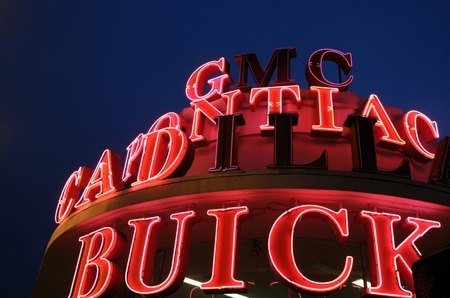GM To Axe 1700 Dealers, STAT. Can They Do That?
As part of GM CEO Fritz Henderson’s “ Deeper, Faster, Oh, Baby” plan to implement GM’s previous plan—only more quickly and, uh, dramatically—the General wants to slice 1700 franchised dealers from their roster. Automotive News [AN, sub] reports that a combination of a bad economy and the American automaker’s piss poor management [reading between the lines, paraphrasing, stating the obvious] has shuttered 200 GM dealers so far this year. Only 1500 more to go; you know, in Fritz’s ideal world. Which raises the question: how are they going to do that? “GM officials have told dealers that they would identify underperforming locations and could move to terminate franchise agreements by June 1, a dealer who had received such a notice said on Wednesday.” As AN correctly points out, you can’t just pull the plug on a franchised car dealer without providing them with financial compensation, or stand ready to fight hundreds of lawsuits in all 50 states.
GM is counting on the spin-off or closure of its Saturn and Hummer brands — combined with dealership closures because of declining business conditions and tight credit — to deliver about half of its targeted cuts, according to the dealer.
For the remainder, GM is preparing to terminate franchise agreements without the kind of payouts that it made when it shut down its Oldsmobile division and closed some 2,800 dealerships. That process cost GM more than $1 billion.
I reckon either 1) GM’s rushing through these dealer terminations so the aggrieved store owners’ claims will go to the back of the queue when the automaker files for bankruptcy on June 1. (In other words, disappear.) Or 2) The Presidential Task Force on autos is preparing to create some legal wrinkle that allows GM to walk away from all its dealer obligations. Just. Like. That.
At the same time, federally-funded financier (lender cum bank) GMAC is still cutting a swath through dealers, calling in loans, hoovering-up unsold inventory and… what? This is going to get a lot more complicated before it gets even more complicated. Did I mention the unions? The money GM drew down from Canada? Time for another bailout roundup.
More by Robert Farago
Latest Car Reviews
Read moreLatest Product Reviews
Read moreRecent Comments
- 28-Cars-Later WSJ blurb in Think or Swim:Workers at Volkswagen's Tennessee factory voted to join the United Auto Workers, marking a historic win for the 89- year-old union that is seeking to expand where it has struggled before, with foreign-owned factories in the South.The vote is a breakthrough for the UAW, whose membership has shrunk by about three-quarters since the 1970s, to less than 400,000 workers last year.UAW leaders have hitched their growth ambitions to organizing nonunion auto factories, many of which are in southern states where the Detroit-based labor group has failed several times and antiunion sentiment abounds."People are ready for change," said Kelcey Smith, 48, who has worked in the VW plant's paint shop for about a year, after leaving his job at an Amazon.com warehouse in town. "We look forward to making history and bringing change throughout the entire South." ...Start the clock on a Chattanooga shutdown.
- 1995 SC Didn't Chrysler actually offer something with a rearward facing seat and a desk with a typewriter back in the 60s?
- The Oracle Happy Trails Tadge
- Kwik_Shift_Pro4X Union fees and corruption. What can go wrong?
- Lou_BC How about one of those 2 foot wide horizontal speedometers out of the late 60's Ford Galaxie?


































Comments
Join the conversation
Thank you Pch101. From your answers, it seems to me like the GM is effectively having to pay people to be their dealers. Sort of like being so unpopular that you have to pay someone to be your friend. To me, the answer is pretty clear. Knock that s**t off. GMAC should not be allowed to subsidize credit by not being answerable to GM. This means that the relationship between GM and GMAC needs to be severed. This is similar to the problems at the Wallstreet firms that results in things like Enron. In Wallstreet, one part of the firm pushed stock, and the other part floated the same stock, a clear conflict of interest. GMAC should compete with other sources of capital for a dealerships floorplan credit needs. A dealer should be able to have a choice. And the dealers that hate new GM products that they have to be paid to warehouse inventory, then they can close their new car divisions as they naturally should.